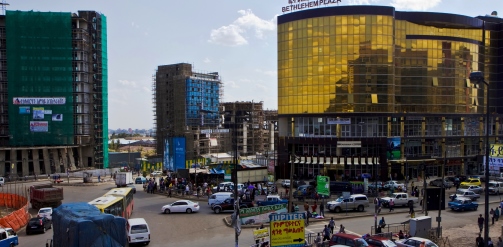Africa is the world’s youngest region. Yet, of its 420 million youth aged 15-35, one-third are unemployed, another third are vulnerably employed, and only one in six is in wage employment (PDF). Even when employed young people may still live in poverty: in sub-Saharan Africa the number of poor working youth has increased by 80 per cent for the past 25 years.

With this challenge in mind, we are delighted to welcome a group of eight scholars from across the African continent to critically explore the role of the private sector in addressing one of Africa’s key development challenges: youth unemployment and underemployment. The Matasa Fellows Network aims to contribute to the development of outstanding young researchers who will ultimately become established researchers and engage in policy-oriented research.
Whose responsibility is it to get the youth into employment?
It is not surprising that many African governments and donors have made youth employment a priority. There are many interventions and programmes in place that put youth employment at their heart.
One of the main interventions largely focuses on equipping young people with entrepreneurial skills and some credit, to help them create their own business and to work their own way out of poverty. Other programmes try to build young people’s skills and match them with private sector companies, assuming the ‘skills mismatch’ is one of the key challenges causing un- and underemployment among young people, even if they completed secondary education.
However, this bias towards the ‘supply side’ of labour fails to acknowledge that actually there are not enough jobs (and won’t be in the short, medium, or even long-ish term) and that economic growth may, in fact, be ‘jobless growth’. Researchers and policymakers need to pay more attention to the ‘demand side’ of labour and labour markets – and the private sector is an important player.
These are significant challenges for the African continent. The 2018 cohort of Matasa fellows look to understand these in depth, and answer some important questions:
- Under which conditions can private sector growth actually deliver jobs for young people? To what extent will these jobs be so–called ‘decent jobs’; secure, well-paid, offer a pension and a maternity package?
- Which challenges do young people face when trying to access a job in the private sector, and how are these gendered?
- What about the private sector in countries that face high levels of corruption, or instability?
- How can policies prevent a private sector that will reproduce vulnerable employment?
What is the Matasa Fellows Network?
Launched in 2015, the Matasa Network awards fellowships to young African scholars, and supports them to develop research relevant to policy and practice. This year, eight Matasa fellows were selected from nearly 200 applicants. They are from Ethiopia, Ghana, Kenya, Nigeria, Uganda and Zimbabwe. They will learn from each other during a week of studying and debate on the role of the private sector for youth employment, and have training on policy influence strategies. In June they will meet again to each produce a high quality synthesis paper and policy brief.
The Matasa fellows will also produce an IDS Bulletin on youth employment and the private sector, which will be launched in November this year. Like the previous Bulletin on Africa’s youth employment challenges, the forthcoming Bulletin promises to be a diverse and exciting collection of articles by a group of highly talented, young African scholars.
The Matasa network is supported by the Mastercard Foundation.